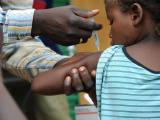Nov 19, 2003 (CIDRAP News) – A combination of vaccines that included smallpox and anthrax might have contributed to the death of a young Army reservist last April, the Department of Defense (DoD) announced today.
Two panels of civilian experts concluded that the vaccinations might have led to the death of Specialist Rachel Lacy on Apr 4, DoD officials said in a news release. The vaccines included smallpox, anthrax, typhoid, hepatitis B, and measles-mumps-rubella. The Pentagon said Lacy received the vaccines Mar 2 at Fort McCoy, Wis., where her unit was preparing for overseas deployment.
Because Lacy received all the vaccines the same day, the expert panels could not determine which of them might have contributed to her death, DoD said. The panels said that though the evidence "favored a causal relationship," it was not conclusive.
According to DoD's online Smallpox Vaccination Safety Summary, Lacy's case is the first case in the current immunization program in which investigation indicated that the vaccine might have caused death. Four other deaths that followed vaccination have been investigated, the summary says.
Lacy experienced "a complex set of pulmonary, neurological and other symptoms" after the vaccinations, the DoD statement said. "She died due to a severe inflammatory process affecting her lungs, findings consistent with a diagnosis of systemic lupus erythematosus (SLE) or lupus. She did not know she had an underlying immune system disorder, nor did any of her physicians."
Lacy, who came from Lynwood, Ill., was a combat medic with the 452d Combat Support Hospital, which was later deployed to Afghanistan, according to DoD. She died at the Mayo Clinic in Rochester, Minn.
"Specialist Lacy's case was rare and clearly tragic," said Dr. William Winkenwerder, assistant secretary of defense for health affairs. "An important conclusion of both expert groups is that nothing was discovered that indicates our screening programs could have prevented the illness and ultimate death of Specialist Lacy, who had an underlying undiagnosed disorder."
Winkenwerder said DoD would continue its vaccination programs but has asked an advisory panel to evaluate the practice of simultaneous vaccinations. He also commented, "It is important for us to acknowledge the possibility of an association between vaccination and the illness that led to the death of Specialist Lacy. We pledged when we began the vaccination programs to bring the best science to bear in monitoring adverse events after vaccination, and with these reports we are doing this."
More than 900,000 military personnel have been vaccinated against anthrax in the past several years, and more than 500,000 have been vaccinated for smallpox since last December, officials said.
The two expert committees were convened several months ago as part of DoD's surveillance for potential adverse effects of vaccines, officials said. One panel was the Smallpox Vaccine Safety Working Group (SVSWG), a joint subcommittee of the Advisory Committee on Immunization Practices and the Armed Forces Epidemiological Board. (The ACIP advises the Centers for Disease Control and Prevention, while the AFEB advises the DoD.) The SVWSG concluded that "the weight of available evidence favors acceptance of a causal relationship between the immunization experience and the disease" in Lacy's case but does not prove it conclusively, a DoD statement said.
"There's a chance that the immunization experience triggered this disease process," Dr. John Neff, chair of the SVSWG, told CIDRAP News. "There was no evidence that could definitely establish or definitely reject a causal association." Neff is a pediatrician at the Children's Hospital and Regional Medical Center in Seattle.
The other panel was the Clinical Expert Immunization Committee (CEIC), a group of private academic physicians convened by the Health Resources and Services Administration, part of the Department of Health and Human Services. After reviewing Lacy's case, three CEIC members concluded that a relationship between the vaccinations and her death was "possible," while two members thought that a relationship was "probable," the DoD said.
The two panels were used because of their "complementary expertise," the Pentagon said. The SVSWG has monitored adverse events reports about smallpox vaccination since the current vaccination program was launched in December 2002. The CEIC succeeds a committee that reviewed adverse events reported in the anthrax vaccination program between 1998 and 2001.
The SWSWG also reviewed three other cases in which vaccinated service members became ill or died, and the CEIC reviewed one of those cases. The panels found no association between the immunizations and those cases, DoD officials said. The diagnoses in those instances were drug overdose, pulmonary embolism, and atrial fibrillation.
Lacy was treated for her illness at a clinic at Fort McCoy and at nearby hospitals starting in mid-March, according to a DoD statement released this afternoon. Specialists who later treated her at the Mayo Clinic consulted with DoD clinical experts, the Minnesota Department of Health, and the CDC. After her death, the CDC and DoD conducted additional laboratory tests to investigate what happened.
Her death certificate lists the cause of death as "diffuse alveolar damage," the DoD said. The certificate also states that she had pericarditis (inflammation of the lining of the heart), a condition that has been seen in a number of military and civilian smallpox vaccinees this year. A DoD smallpox safety report issued in October said that 58 vaccinees had myocarditis or pericarditis after vaccination. But the CEIC found that Lacy's pericarditis differed from other myopericarditis cases seen after vaccination. "The CEIC noted that pericarditis developed late in this soldier's case and did not seem to be the main reason for her illness," the DoD said.
The department also said Lacy did not have meningitis, encephalitis, or evidence of vaccinia virus (the virus used in the smallpox vaccine) in her spinal fluid.
The statement noted that the smallpox and measles-mumps-rubella vaccines contain live viruses, while the other vaccines Lacy received were inactivated vaccines. But no evidence pointed to any one vaccine. "Live virus vaccines have traditionally been considered more vigorous in the spectrum of adverse events that can follow vaccination, but there is no objective data to affirm this in the case at hand," the statement said.
Systemic lupus erythematosus (SLE) is considered an autoimmune disorder. The DoD said the medical literature includes a few case reports of autoimmune disease occurring after vaccination, but there is no proof of a cause-and-effect relationship.
One key finding that implicated the immunizations in Lacy's case was "an unusual pattern of antibodies called anti-Ro antibodies that have been associated with lupus [SLE] in some patients," DoD reported. "A very small proportion of people who carry the antibody may experience some kind of 'trigger' that sets in motion a lupus reaction. This lab finding leads some to conclude that the vaccines may have triggered her lupus." However, Lacy had received multiple vaccinations previously, when she entered the military and earlier in life as well.
Because Lacy had been healthy, had been medically cleared for the vaccinations, and had provided all requested information during screening, "Neither DoD nor the soldier knew any reason not to vaccinate her," officials said.
Conditions and treatments that cause immune system deficiencies are listed as contraindications to smallpox vaccination in the absence of an actual smallpox outbreak. Since SLE is considered an autoimmune disorder, smallpox vaccination would be considered risky for people with the condition. (See vaccine information in CIDRAP overview of smallpox.) However, Lacy was not known to have the disease.
See also:
DoD Nov 19 news release
http://www.defense.gov/releases/release.aspx?releaseid=5799
DoD smallpox vaccine safety summary
http://www.smallpox.army.mil/event/SPSafetySum.asp
DoD Anthrax Vaccine Immunization Program site
http://www.anthrax.osd.mil/

















